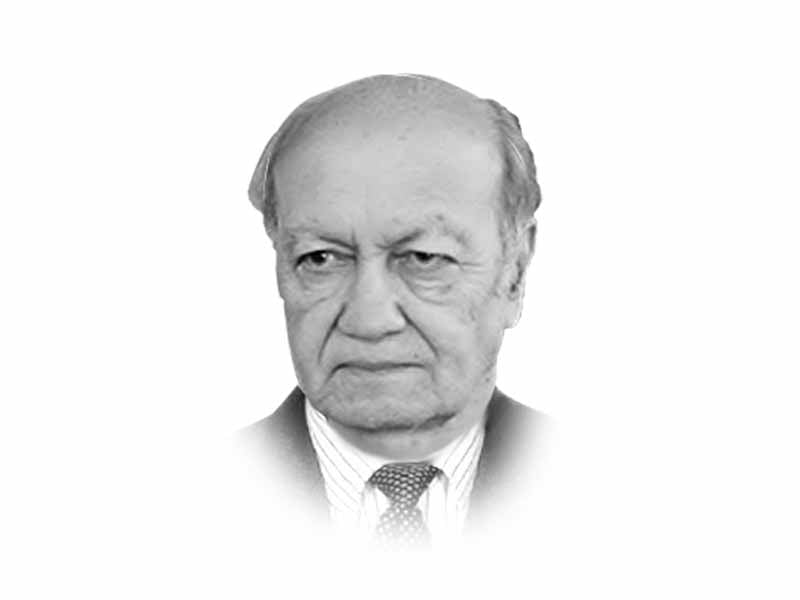
US President Joe Biden’s recent remarks about Pakistan being “one of the most dangerous nations in the world” and “nuclear nation without any cohesion”, doubting the safety protocols of the country’s nuclear weapons had justifiably outraged the nation. Although later the White House spokesperson downplayed the remarks. For indeed the safety and security of our nuclear assets meets global standards and is well recognised by the International Atomic Energy Agency (IAEA).
But when serious incidents as on the life of the former PM Imran Khan take place and thousands of people are on the streets to protest even occasionally getting rowdy, or the long march that attracts multitude of people on streets for days, an air of insecurity prevails. All these events reinforce the image of Pakistan as an insecure and unstable state. Not to ignore what all this march entails in terms of loss of millions of working hours affecting an economy that is already steeply mired in loans and heavily dependent on external financing.
The public statement of Imran Khan soon after the assassination attempt that the PM, Minister of Interior and a Major General of the ISI are behind attack takes the animosity and mistrust between Khan and the PML-N and army leadership to a new level — not realising that such unsubstantiated allegations only reinforce President Biden’s remarks with serious long-term consequences.
What probably has still not sunk in with our leaders how adversely the present state of politics is affecting the economy and our international image and standing. Due to the overall security situation, China the close strategic ally had expressed its serious concern about the safety and security of their citizens. Most embassies’ advisories discourage citizens to visit Pakistan and those who have to are advised to restrict their exposure to the minimum. It is not surprising that we hardly see citizens from foreign countries in public and those who come on official visits are fully escorted. This is affecting our economy as investment has declined to its lowest level. So has tourism and travel. Activity in CPEC has lost its momentum partly due to weak security.
The frequent and even unkind remarks about the army leadership by Khan have a direct bearing on the morale of the troops. There are contradictions in his dealings with the army leadership. Whereas he would like them to stay away from politics but also has been seeking their support in the current political rivalry. By ignoring the parliament and taking politics to the streets Imran Khan weakens democracy and denies the opportunity for elected representatives to discuss serious economic, foreign relations and security issues. Meanwhile, the Tehrik-e-Taliban Pakistan and the Baloch Liberation Army have stepped up their activities and making inroads in Khyber-Pakhtunkhwa and Balochistan. Officers and other ranks are laying down their lives to defend the borders but their sacrifices are going unnoticed by the political leadership. The security situation has social, political and economic dimensions that should not be left only for the military leadership to address.
We have not heard how the PTI leadership plans to lift the economy, stabilise politics and improve relations with major powers if it gets back into power. Pakistan’s past and present rulers — political and military — have been used to making tall claims but execution has been generally disappointing. What needs to be realised that weak governance and inadequate measures to improve the plight of masses has an adverse domino effect on other areas of national activity.
It is important that our leading economists give wide publicity to the economic loss the country is suffering due to the prevailing conditions. As politicians are likely to remain entangled in their narrow and self-centred feuds in the foreseeable future, civil society leadership and media should take the lead in bringing sanity in national discourse. Currently, our media is focusing mostly on what the politicians are saying and giving running commentary on Imran Khan’s moves and policies. This is not to deny the importance of Khan’s thinking and the unique position that he has carved for himself in national politics but it is in larger interest of the nation to listen to alternate views and viable policies. This would broaden the scope of the dialogue and lead to resolving issues and finding a way out instead of getting deeper into the quagmire where it is only one sport that is blame game.
It would be naïve to rule out the possibility that outside elements, focused on harming Pakistan, could be involved in the murder attempt on Khan. From their perspective if this strategy results in chaos and civil war conditions, they have achieved more than what they would have through open confrontation. As events have unfolded, irrespective of their involvement or not, they are clearly one of its major beneficiaries.
It is sometimes beyond comprehension as to why our leaders are so indifferent to the real issues facing the country. A glaring weakness has been the national economy that has made us virtually dependent on foreign assistance, seriously compromising our independence. All our assets, a hardworking and resilient people, country strategically located remain under-utilised due to lack of direction, prevailing anarchic conditions in which politics is unable to focus on economic issues. The more we borrow the more we are mortgaging the nation’s future. If the government fails to invest in education and health of the people our future is doomed. We are already in the midst of a serious crisis attributed mainly to the failure of past and present governments for not giving these matters sufficient attention. Our complacency is showing in practically every area, be it the burgeoning population growth, acute energy shortages and hazards of climate change. The recent floods remind us that nature can be unpredictable and nations have to be prepared for these contingencies.
The foremost corrective measure has to be sane politics, avoiding empty rhetoric, stabilising the economy and finding workable solutions.
Published in The Express Tribune, November 9th, 2022.
Like Opinion & Editorial on Facebook, follow @ETOpEd on Twitter to receive all updates on all our daily pieces.













COMMENTS (1)
Comments are moderated and generally will be posted if they are on-topic and not abusive.
For more information, please see our Comments FAQ